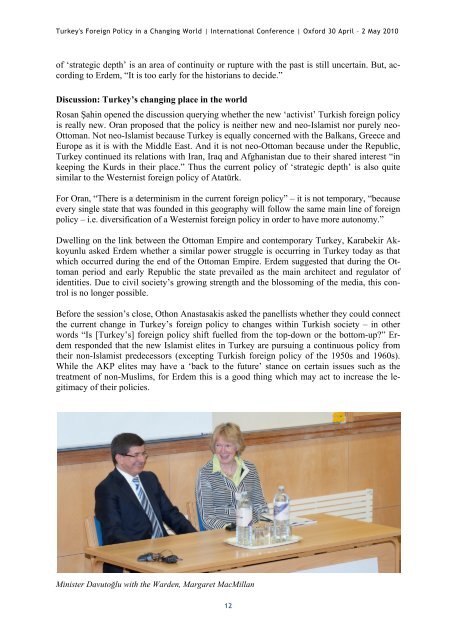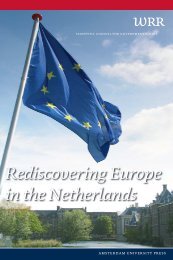Turkey's Foreign Policy in a Changing World - St Antony's College ...
Turkey's Foreign Policy in a Changing World - St Antony's College ...
Turkey's Foreign Policy in a Changing World - St Antony's College ...
You also want an ePaper? Increase the reach of your titles
YUMPU automatically turns print PDFs into web optimized ePapers that Google loves.
<strong>Turkey's</strong> <strong>Foreign</strong> <strong>Policy</strong> <strong>in</strong> a Chang<strong>in</strong>g <strong>World</strong> | International Conference | Oxford 30 April – 2 May 2010<br />
of ‘strategic depth’ is an area of cont<strong>in</strong>uity or rupture with the past is still uncerta<strong>in</strong>. But, accord<strong>in</strong>g<br />
to Erdem, “It is too early for the historians to decide.”<br />
Discussion: Turkey’s chang<strong>in</strong>g place <strong>in</strong> the world<br />
Rosan Şah<strong>in</strong> opened the discussion query<strong>in</strong>g whether the new ‘activist’ Turkish foreign policy<br />
is really new. Oran proposed that the policy is neither new and neo-Islamist nor purely neo-<br />
Ottoman. Not neo-Islamist because Turkey is equally concerned with the Balkans, Greece and<br />
Europe as it is with the Middle East. And it is not neo-Ottoman because under the Republic,<br />
Turkey cont<strong>in</strong>ued its relations with Iran, Iraq and Afghanistan due to their shared <strong>in</strong>terest “<strong>in</strong><br />
keep<strong>in</strong>g the Kurds <strong>in</strong> their place.” Thus the current policy of ‘strategic depth’ is also quite<br />
similar to the Westernist foreign policy of Atatürk.<br />
For Oran, “There is a determ<strong>in</strong>ism <strong>in</strong> the current foreign policy” – it is not temporary, “because<br />
every s<strong>in</strong>gle state that was founded <strong>in</strong> this geography will follow the same ma<strong>in</strong> l<strong>in</strong>e of foreign<br />
policy – i.e. diversification of a Westernist foreign policy <strong>in</strong> order to have more autonomy.”<br />
Dwell<strong>in</strong>g on the l<strong>in</strong>k between the Ottoman Empire and contemporary Turkey, Karabekir Akkoyunlu<br />
asked Erdem whether a similar power struggle is occurr<strong>in</strong>g <strong>in</strong> Turkey today as that<br />
which occurred dur<strong>in</strong>g the end of the Ottoman Empire. Erdem suggested that dur<strong>in</strong>g the Ottoman<br />
period and early Republic the state prevailed as the ma<strong>in</strong> architect and regulator of<br />
identities. Due to civil society’s grow<strong>in</strong>g strength and the blossom<strong>in</strong>g of the media, this control<br />
is no longer possible.<br />
Before the session’s close, Othon Anastasakis asked the panellists whether they could connect<br />
the current change <strong>in</strong> Turkey’s foreign policy to changes with<strong>in</strong> Turkish society – <strong>in</strong> other<br />
words “Is [Turkey’s] foreign policy shift fuelled from the top-down or the bottom-up?” Erdem<br />
responded that the new Islamist elites <strong>in</strong> Turkey are pursu<strong>in</strong>g a cont<strong>in</strong>uous policy from<br />
their non-Islamist predecessors (except<strong>in</strong>g Turkish foreign policy of the 1950s and 1960s).<br />
While the AKP elites may have a ‘back to the future’ stance on certa<strong>in</strong> issues such as the<br />
treatment of non-Muslims, for Erdem this is a good th<strong>in</strong>g which may act to <strong>in</strong>crease the legitimacy<br />
of their policies.<br />
M<strong>in</strong>ister Davutoğlu with the Warden, Margaret MacMillan<br />
12

















